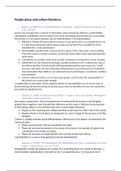People place and culture literature
- Ritzer, G. (1983) “The ‘McDonaldization’ of Society”, Journal of American Culture, vol.
6 (1), 100-107
Society has changed into a society of rationality: characterized by efficiency, predictability,
calculability, substitution of non-human for human technology and control over uncertainty.
McDonalds is a very good example case of rationalization McDonaldization.
Efficiency: finding the best optimum means to any given end e.g. people like to eat
in a fast food-restaurant where cheap meals are served. This is possible bc of the
assembly line mass production.
Predictability: people want to know what to expect when they enter a given setting.
They don’t want or expect surprises fast food chains often serve approximately the
same menu.
Calculability or quantity rather than quality: emphasis on things that can be counted.
Substitution of non-human technology: people continue to act in unforeseen ways
not able to predict some people will keep producing their own meals etc. To still
increase rationality, we limit individual independence ppl who work at McDonalds
have eliminated their ability to act autonomously by techniques, procedures, routines
and machines.
Control: rational systems are set up to get greater control over the uncertainties of
life (which are mostly other people)
irrationality of rationality: all the negative effects of rationalization e.g. it can be seen as
dehumanizing and disenchanting, by producing as much as possible we use more pesticides
and artificial ingredients etc.
- Massey, D. (1994) “A Global Sense of Place” in: Space, Place and Gender, Minneapolis:
University of Minnesota Press
time-space compression: the increasing sense of connectivity that seems to be bringing
people closer together, even though their distances are the same distance decay because
of technology (allows us to communicate more across longer distances).
People on the receiving end: eating food that comes from the other side of the world.
People who do a lot of physical moving but are not in charge of the process at all, like
refugees.
there is a highly complex social differentiation: differences in the degree of movement and
communication.
Places are processes: they are absolutely not static.
Places do not have boundaries in the sense of enclosure: the outside of a place also
contributes to the inside of a place.
Places do not have on single identity: they are full of internal conflicts.
globalization is a source of geographical uneven development
- Bauman, Z. (1998) “On Glocalisation: Or Globalization for Some, Localization for Some
Others”, Thesis Eleven, vol. 54, 37-49
Globalization entails the absence of a center, of a controlling desk, of a board of directors
world disorder. Globalization is not smt we do, it is happening to us it has given more
, opportunities for the extremely wealthy to make money more quickly it is beneficial to a
few.
Glocalisation = the adaptation of international products around the particularities of a local
culture in which they are sold this allows integration of local markets into world markets
redistribution of privileges, wealth, poverty, power.
Opposition interplay between globalizing and localizing trends:
Gemeinschaft/Gesellschaft.
- Gustafson, P. (2001) “Meanings of Place: Everyday Experience and Theoretical
Conceptualizations”, Journal of Environmental Psychology, vol. 21, 5-16
Carter: face theory – four interrelated facets of place
1. Functional differentiation: activities
2. Place objectives: individual, social and cultural aspects of lace experiences
3. Scale of interaction: importance of environmental scale
4. Aspects of design: physical characteristic of place
Agnew: place consists of location (geographic area), locale (social relations) and sense of
place (structure of feeling)
Kaltenborn: two important factors
Nature culture: place as a natural environment / cultural landscape
Family social: concerning family life at the recreational home and social relations in
the area.
Principles of identity (breakwell)
Distinctiveness: place identification to distinguish themselves from others
Continuity: place provides a sense of continuity of the self as ppl have lived at the
same place or type of place for a long time
Self-esteem: ppl feel proud about the place they live
Self-efficacy: qualities of the residential area facilitate respondent’s everyday life in
various ways.
Outcome of Gustafson’s own interviews: meanings of place as expressed by interviewees
(three pole model: self, other, environment):
Self: places have highly personal meanings
Self-others: relationship between self and others places often become meaningful
because of the respondent’s relation with people living there and the sense of
community that such social relations create.
Others: places have their meaning bc the characteristics, traits and behaviour of its
inhabitants.
Others-environment: atmosphere, climate, street life.
Environment: meaning of place doesn’t depend on self nor on others physical
environment.
Environment-self: relationship between self and environment knowledge of place
like geographical or historical knowledge.
Self-others-environment: all in one.
places may have a lot of meanings to different people. Not all places mean the same to
everybody. Important for meaning of place
1. Distinction: a meaningful place must appear as an identifiable, distinguishable
territorial unit.
2. Valuation: positive or negative about places/inhabitants






